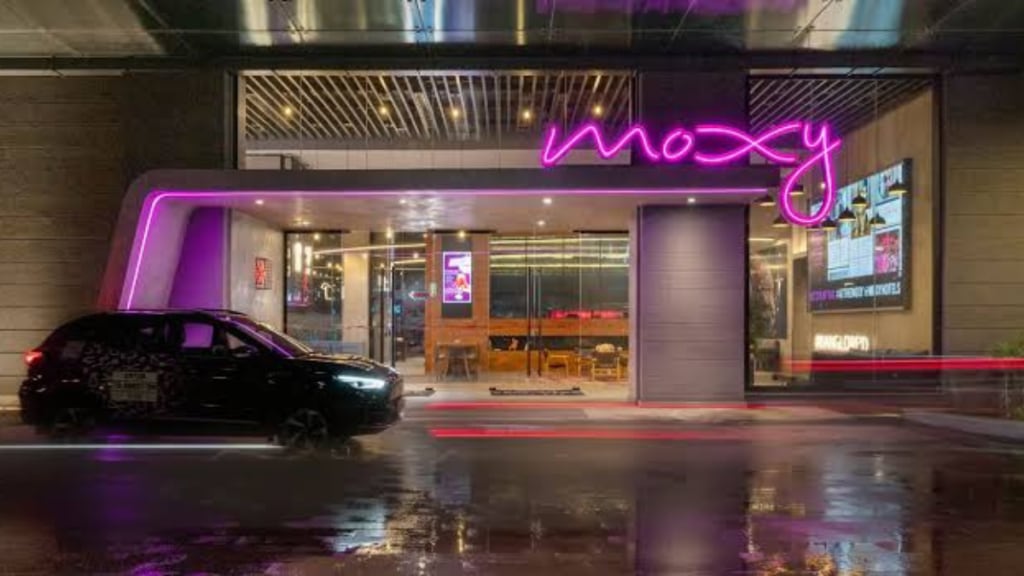Millennials and Gen Z consumers like to take on the role of being their own travel agent to curate personalised experiences. This always-on squad relies on reviews and commentaries to integrate diverse viewpoints into their research and decision-making. For them, traveling is part of their self-expression and self-discovery.
So Moxy Hotels is making emotion the new brand standard.
After establishing a robust presence in India with 153 hotels spanning 17 brands across more than 40 cities, Marriott International has decided to double down on the younger and more playful Moxy brand. Marriott claims it is designed for the fun-loving Millennial and Gen Z, or anyone else who is “young at heart”, blending affordability with just the right amount of luxury.
Among the hotel’s standout features are its unconventional check-in, which happens at the bar, and the presence of robot staff to assist guests. Self-service options and a buzzing communal area encourage interaction among visitors, while in-room tech adds a layer of personalisation. “Smart controls for lighting and entertainment, paired with smart TVs and streaming services, make it easy for guests to unwind with their favourite shows,” says Ranju Alex, area vice-president, South Asia, Marriott International.
But with room rates starting at over `10,000 per night, Moxy isn’t competing with budget hostels that also offer communal spaces, nor is it trying to rival traditional hotels that focus on formal luxury. Instead, it’s trying to carve out a niche in the area of playful luxury. It aims to cater to travelers who want both social interaction and modern comfort. The free access to in-house DJ nights, music events and gaming zones are all geared to play that part.
Marriott is also eyeing a burgeoning segment of travelers who would want to blend business with leisure — or the “bleisure” segment. The numbers are promising. According to Deloitte India’s latest Corporate Travel report, the country’s corporate travel market is projected to double to $20.8 billion by FY30, while the overall travel sector is expected to reach $97 billion, growing at a CAGR of nearly 9%.
Experts reckon this segment is fueled by hybrid work models and tech innovation. “A lot of this growth is tied to post-pandemic behaviour shifts,” says Anand Ramanathan, partner and consumer industry leader, consulting, Deloitte India. “The shift to remote work fundamentally changed corporate life, leading to a whole new category of travel that blends business with leisure.”
Marriott’s Alex says, “We know Millennials, in particular, tend to extend business trips by a day or two to explore their destination. For those guests who need to juggle work while enjoying their stay, we offer flexible spaces designed for productivity—whether that’s in our lounge areas equipped with plug-and-play options or other common spaces that allow guests to stay connected while making the most of their trip.”
The thing is, there’s also been a notable 24% rise in bookings for alternative accommodations as today’s travelers prioritise “unique” over “standout” and “vibrant” over “luxurious”. Experts say hotels have no options but to offer personalised stays to win back consumers. “Moxy’s focus on dynamic communal spaces and competitive pricing aligns perfectly with these trends,” adds Alex.
To meet its target consumer where she resides, the brand is using a mix of digital and experiential marketing. It launched its second Moxy hotel in Mumbai with Bollywood star Ananya Pandey and invited people to a scavenger hunt across Mumbai with four Moxy-branded, influencer-driven Range Rovers.
Will all this be enough to impress its intended audience? Says Nisha Sampath, managing partner, Bright Angles Consulting, “Irrespective of cohort, India is both a price and value-sensitive market when it comes to leisure travel. OYO, Fab Hotels and Ginger all cater to this need and hence have shown traction. At the current price premium, only a niche and affluent segment of users can afford Moxy.”
There is also the risk of appearing a tad over the top, points out Yasin Hamidani, director, Media Care Brand Solutions. “India’s youth is diverse, with varying tastes and cultural backgrounds, making it challenging to create a universally appealing brand experience. Moxy’s playful and bold branding could risk being perceived as too ‘edgy’ or ‘sleazy’ in a market where traditional values still hold significant sway.”
Bottom line, hotel brands must provide services that give consumers a bang for their buck, says Jagmohan Singh, founder of Riohills hospitality.

